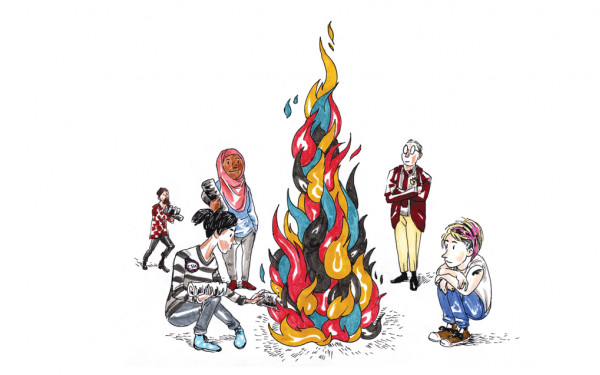Still Plenty of Reasons to Take Back the Night
Centre for Gender Advocacy: ConU Sexual Assault Policy, Idea of Consent Still Lacking
While denouncing gendered violence and demanding a safer community free of harassment and sexual assault, the roughly 100 participants of the Take Back the Night march on Friday also had a success story to celebrate this year.
“Last time we marched, we carried a banner through the streets of Montreal calling [on] our university to open a sexual assault resource centre, and one year later, we mark a milestone with the opening of the centre’s doors just two weeks ago,” Concordia student Julia Nadeau, a volunteer with the “A Safer Concordia” campaign, told the crowd.
The march began at Norman Bethune Square and proceeded along Ste. Catherine St. and McGill College Ave. It ended in front of the building of the Students’ Society of McGill University on McTavish St.
Concordia’s Sexual Assault Resource Centre officially opened its doors Nov. 11 with a mandate to provide sexual assault survivors with resources and referrals, as well as raise awareness of sexual violence.
The Concordia-based Centre for Gender Advocacy, which originally petitioned the university to open a safe space for sexual assault survivors, organized the march for a second year in a row, although women’s groups, rape crisis centres, colleges and universities have organized Take Back the Night rallies in Montreal and internationally for years.
“As we celebrate this important success, there’s more work to be done to create a safer Concordia—most crucially, to push for mandatory consent workshops in all residences and university sports teams,” Nadeau continued.
On Nov. 1, the Montreal Gazette reported that three McGill fourth-year students were charged in July 2012 with the sexual assault and forcible confinement of a then-Concordia student the previous year. They continued to play on the university’s football team despite the allegations, only quitting after their situation was made public.
This sexual assault case at McGill reveals the ongoing need to “keep universities accountable and stop them from turning a blind eye to this issue,” Nadeau said.
“School administrations must actively promote consent and support survivors, not perpetrators,” she added.
Now that Concordia has its own sexual assault centre, Julie Michaud, the Centre for Gender Advocacy’s administrative coordinator, says the Centre will support the SARC’s new coordinator, Jennifer Drummond, in rolling out consent education programs.
The Centre will also continue to push Concordia to formulate “an actual sexual assault policy,” according to Michaud.
“There are a lot of different elements to a good sexual assault policy,” Michaud said. “Some things that are important to have […] are provisions that would exempt a survivor reporting a sexual assault [from] repercussions for any unrelated, disallowed behaviour at Concordia.”
For example, a sexual assault policy might shield a victim from repercussions if they consumed alcohol or drugs on campus and then happened to get sexually assaulted, Michaud said, adding that it would also clarify what the university’s expectations are in terms of behaviour.
“Currently, the slight mention of sexual assault that does exist in the [university’s] Code of Rights and Responsibilities is very vague, and it really needs to be made clear what the whole breadth of sexual assault is,” she said.
“A lot of people just don’t really get it and they think that sexual assault is just a stranger violently raping you in a dark alley, and that’s not usually how it happens. We need to be really clear that sexual assault is any unwanted act of a sexual nature.”
Olivia Wong, another Concordia student and volunteer with the “A Safer Concordia” campaign, said perpetrators don’t always recognize that they’ve raped or sexually assaulted someone because of a lack of education on consent.
“When someone’s intoxicated, someone’s drunk […] they can’t really consent in that state of mind,” Wong said. “A ‘yes’ that’s under pressure is being coerced—[it] is not a yes.”
Bianca Mugyenyi, the Centre for Gender Advocacy’s programming and campaigns coordinator, said she thinks “we do still unfortunately live in a rape culture.”
She said the media’s tendency to often ignore or trivialize sexual violence and the existence of “rape jokes” that don’t take sexual violence seriously are indicative of a society that continues to minimize sexual assault.
“When people come forward, they’re treated with suspicion […] by the police, by courts, by the media,” Mugyenyi said. “That makes it very, very difficult to seek justice, because people are made very vulnerable when they do speak out.”
First-year Concordia student Mandy Martel-Perry said she believes the root cause of sexual violence—the “systemic violence against women” that includes unequal access between genders to different resources—isn’t discussed enough.
She said she decided to participate in the march because “there’s still validity in wanting to walk the streets safely at night.”
“Personally, I find I have to take a lot of precautions whenever I go [out] at night,” she said. “Such is not the case with everyone that I know. Gender, I think, does play a role in that—but that doesn’t mean that all genders don’t experience violence or threats of violence when they’re walking at night.”

_900_600_90.jpg)



_600_375_90_s_c1.jpg)
2_600_375_90_s_c1.jpg)